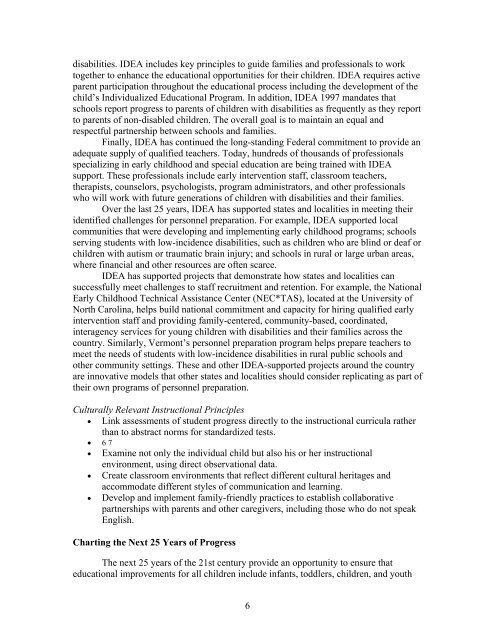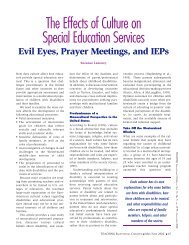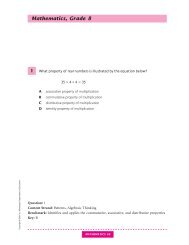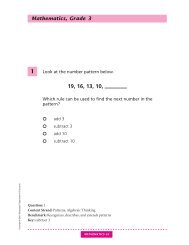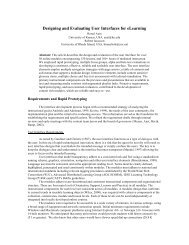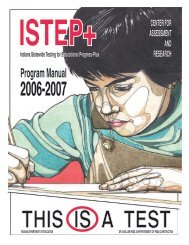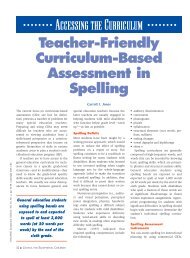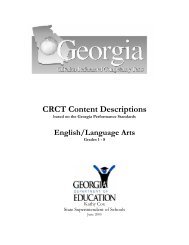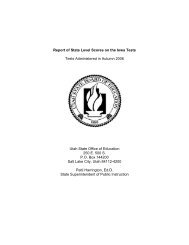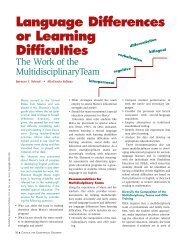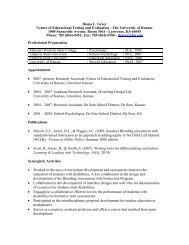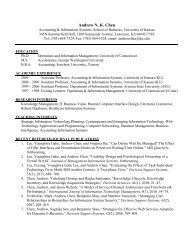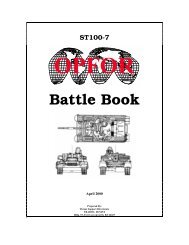Twenty-five years of progress in educating children with disabilities ...
Twenty-five years of progress in educating children with disabilities ...
Twenty-five years of progress in educating children with disabilities ...
Create successful ePaper yourself
Turn your PDF publications into a flip-book with our unique Google optimized e-Paper software.
<strong>disabilities</strong>. IDEA <strong>in</strong>cludes key pr<strong>in</strong>ciples to guide families and pr<strong>of</strong>essionals to work<br />
together to enhance the educational opportunities for their <strong>children</strong>. IDEA requires active<br />
parent participation throughout the educational process <strong>in</strong>clud<strong>in</strong>g the development <strong>of</strong> the<br />
child’s Individualized Educational Program. In addition, IDEA 1997 mandates that<br />
schools report <strong>progress</strong> to parents <strong>of</strong> <strong>children</strong> <strong>with</strong> <strong>disabilities</strong> as frequently as they report<br />
to parents <strong>of</strong> non-disabled <strong>children</strong>. The overall goal is to ma<strong>in</strong>ta<strong>in</strong> an equal and<br />
respectful partnership between schools and families.<br />
F<strong>in</strong>ally, IDEA has cont<strong>in</strong>ued the long-stand<strong>in</strong>g Federal commitment to provide an<br />
adequate supply <strong>of</strong> qualified teachers. Today, hundreds <strong>of</strong> thousands <strong>of</strong> pr<strong>of</strong>essionals<br />
specializ<strong>in</strong>g <strong>in</strong> early childhood and special education are be<strong>in</strong>g tra<strong>in</strong>ed <strong>with</strong> IDEA<br />
support. These pr<strong>of</strong>essionals <strong>in</strong>clude early <strong>in</strong>tervention staff, classroom teachers,<br />
therapists, counselors, psychologists, program adm<strong>in</strong>istrators, and other pr<strong>of</strong>essionals<br />
who will work <strong>with</strong> future generations <strong>of</strong> <strong>children</strong> <strong>with</strong> <strong>disabilities</strong> and their families.<br />
Over the last 25 <strong>years</strong>, IDEA has supported states and localities <strong>in</strong> meet<strong>in</strong>g their<br />
identified challenges for personnel preparation. For example, IDEA supported local<br />
communities that were develop<strong>in</strong>g and implement<strong>in</strong>g early childhood programs; schools<br />
serv<strong>in</strong>g students <strong>with</strong> low-<strong>in</strong>cidence <strong>disabilities</strong>, such as <strong>children</strong> who are bl<strong>in</strong>d or deaf or<br />
<strong>children</strong> <strong>with</strong> autism or traumatic bra<strong>in</strong> <strong>in</strong>jury; and schools <strong>in</strong> rural or large urban areas,<br />
where f<strong>in</strong>ancial and other resources are <strong>of</strong>ten scarce.<br />
IDEA has supported projects that demonstrate how states and localities can<br />
successfully meet challenges to staff recruitment and retention. For example, the National<br />
Early Childhood Technical Assistance Center (NEC*TAS), located at the University <strong>of</strong><br />
North Carol<strong>in</strong>a, helps build national commitment and capacity for hir<strong>in</strong>g qualified early<br />
<strong>in</strong>tervention staff and provid<strong>in</strong>g family-centered, community-based, coord<strong>in</strong>ated,<br />
<strong>in</strong>teragency services for young <strong>children</strong> <strong>with</strong> <strong>disabilities</strong> and their families across the<br />
country. Similarly, Vermont’s personnel preparation program helps prepare teachers to<br />
meet the needs <strong>of</strong> students <strong>with</strong> low-<strong>in</strong>cidence <strong>disabilities</strong> <strong>in</strong> rural public schools and<br />
other community sett<strong>in</strong>gs. These and other IDEA-supported projects around the country<br />
are <strong>in</strong>novative models that other states and localities should consider replicat<strong>in</strong>g as part <strong>of</strong><br />
their own programs <strong>of</strong> personnel preparation.<br />
Culturally Relevant Instructional Pr<strong>in</strong>ciples<br />
• L<strong>in</strong>k assessments <strong>of</strong> student <strong>progress</strong> directly to the <strong>in</strong>structional curricula rather<br />
than to abstract norms for standardized tests.<br />
• 6 7<br />
• Exam<strong>in</strong>e not only the <strong>in</strong>dividual child but also his or her <strong>in</strong>structional<br />
environment, us<strong>in</strong>g direct observational data.<br />
• Create classroom environments that reflect different cultural heritages and<br />
accommodate different styles <strong>of</strong> communication and learn<strong>in</strong>g.<br />
• Develop and implement family-friendly practices to establish collaborative<br />
partnerships <strong>with</strong> parents and other caregivers, <strong>in</strong>clud<strong>in</strong>g those who do not speak<br />
English.<br />
Chart<strong>in</strong>g the Next 25 Years <strong>of</strong> Progress<br />
The next 25 <strong>years</strong> <strong>of</strong> the 21st century provide an opportunity to ensure that<br />
educational improvements for all <strong>children</strong> <strong>in</strong>clude <strong>in</strong>fants, toddlers, <strong>children</strong>, and youth<br />
6


